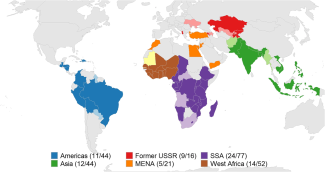
PSC/PARC Researchers Hans-Peter Kohler, Frank F. Furstenberg, Andres Felipe Castro Torres, and Luca Maria Pesando were featured in a Max Planck Institute for Demographic Research press release on their new article, "Family Change and Variation Through the Lens of Family Configurations in Low- and Middle-Income Countries," published in Population, Space, and Place and supported by the National Science Foundation. This paper is a result of the Global Family Change project, supported by the PSC, which is also a PARC Research Network.
Key Points:
- This paper finds a strong correlation between traditional partnership regimes (early and widespread marriage and early transition to motherhood) and traditional gender norms within the household and at a societal level.
- The correlation between traditional partnership and gender regimes is relatively independent of reproduction levels, meaning it exists in countries with both high and low fertility levels and contraceptive use.
- In some countries, traditional partnership and gender regimes differentiate between urban and rural geographies suggesting the influence of the Western family model is uneven cross-nationally and more present in urban areas.
- The family configurational approach developed in this paper encompasses more dimensions, characteristics, and functions in the study of families in a global comparative context. These characteristics include, for example, family formation patterns, gender roles, and fertility.
- This approach provides new insights and questions on how and why the institution of the family has and will change.